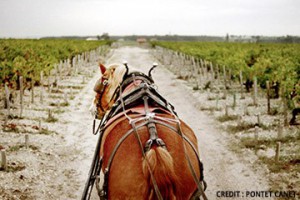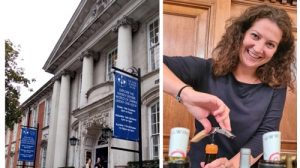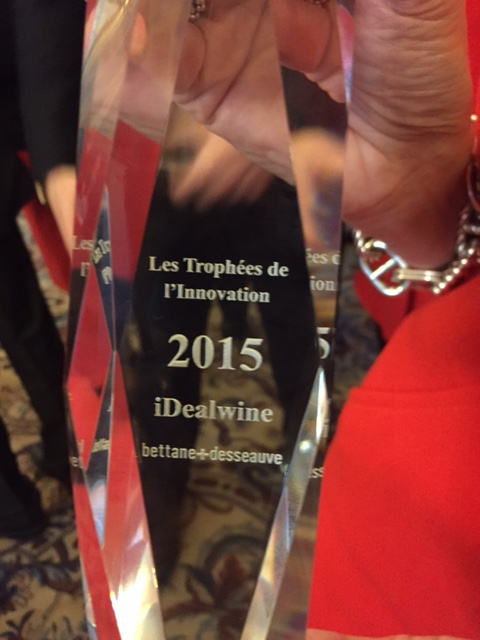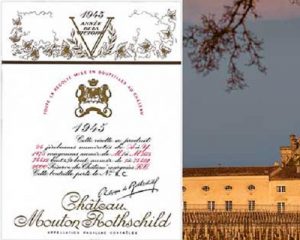An introduction to sustainability

Impossible to miss, this yearly “grande messe” of the En Primeur, where about 5,000 wine trade and press gather talking, gossiping, swirling, spitting, bashing or praising the new releases. For my second year of this tasting, I was glad to discover a better vintage than 2013. Part of the iDealwine team of four visiting this year, we tasted hundreds of extremely (often too) young juices full of tannins and anthocyanins, all the way from the left to the right bank. We finished our two-day visit with obviously black teeth, many notes and great souvenirs of meetings with winemakers, owners and workers. They were often proud and sometimes concerned about the release in the current economic environment, which we all know about… so let’s not touch this topic now.
I wanted to share a great moment of tasting with Jean-Michel Comme, regisseur of Pontet-Canet since 1989. For nearly 2 hours, we were privileged to taste the 2014 vintage and above all, drink his inspiring words about the philosophy at Pontet-Canet and in general about sustainability, organic and biodynamic production. Here is a snapshot of their approaches:
The viticulture and winemaking (r)evolution at Pontet-Canet
Jean Michel arrived at Pontet Canet as regisseur in 1989. With the ambition of a young winemaker wishing to continue to improve and raise the quality of its wines to the highest level, he experimented with the latest technologies and viticulture techniques: he started green harvesting and plucking (getting rid of leaves and grapes in the summer to boost juice concentration), used pesticides, chemicals fertilizers and herbicides to fight sicknesses and pest and he launched a second label to select only the best barrels in the grand vin and compete for awards and ratings. Pontet-Canet wine showed beautifully and it was an obvious commercial success, yet something was missing. The wines were powerful, complex, but Jean Michel wasn’t fully satisfied. Quoting late Anne-Claude Leflaive, the Burgundy Biodynamic icon who tragically passed away last week, he said that the greatest wines should elevate the soul and not only the body.
He thus decided to go further in the pursuit of quality of his wines, but this time not in the sense of concentration and power but of respect and sustainability. He progressively evolved in his career path, considering his work more and more as a mission, adding a mystic dimension to it. He gave us the simple example of this “apparently beautiful” yellow colours we could see in between the rows of many neighbouring châteaux: herbicides! The weed burnt by chemicals destroying any living elements and evidently impacting the soil and its close environment. He was shocked of seeing today such heavy use of chemicals that he himself used in the past. He highlighted that from 1945, many winemakers were blinded by the quest to produce the best wines using many environmentaly unfriendly techniques and not realising the longer term consequences on the vineyard itself. The vines produced more juice, with higher alcohol degrees, less skin and lower acidity. According to him, the equation now needs to be the other way round: how to regenerate and protect the vineyard to produce the best wines?
At Pontet-Canet, they pushed the reflection and action very seriously and now the 81ha vineyards is fully cultivated under biodynamic principles, leaving the vine grow as naturally as possible, stopping plucking and green harvesting, using horses and donkeys in the vines and following the moon calendars… I am not sure to understand or believe all the principles but listening to such inspiring man makes you fully respect the philosophy and approach behind it.
I was lucky to have tasted several vintages of Pontet-Canet. It is a wine that we often see in our Online Auctions but I am now curious to taste and compare with the younger vintages. Indeed in the spirits of expressing more the terroir and reduce the aromatic impact of the oak and the lees, they introduced concrete amphoras in 2012, partially replacing traditional oak barrels (about 35% in 2014). They produced 90% of the grand vin as opposed to 50% on average a few year back. The 2014 is an extremely delicate and elegant wine with a beautiful fruit and a long finish.
At Pontet-Canet it is thus not only about biodynamic viticulture, but a complete philosophy at every stage of production. Not many vineyards reach such a level of sustainability, but it is a model that many producers follow. Let’s get a closer look at what sustainable, biodynamic and organic viticulture really means…
Sustainable viticulture: This is not a clearly defined approach, nor controlled by any professional body, but a voluntary practice of viticulturists to being more respectful of the environment. They limit the human impact on the vineyard, treat it only when required and use as little chemicals as possible. Both organic and biodynamic are considered sustainable viticulture, but going a step further, with stricter guidelines and bodies to certify them.
Organic viticulture: Organic viticulture bans synthetic chemicals: herbicide, fungicides, insecticides or fertilisers. They are replaced by natural materials: copper, vegetal insecticides, sulphur but with strictly controlled levels and a natural selection in between species is favoured in the vineyard. Several bodies like Ecocert and The Soil Association support and validate the processes in the industry. In Europe, there is still no legal definition and the wines can thus not specify this term on the labels.
Biodynamic viticulture: The biodynamic follows the same basic principal of the organic methods but adds to it a more spiritual, ethical and practical dimension. The philosophy was initiated at the beginning of previous century by an Austrian philosopher and agriculturalist, Dr Rudolf Steiner. The idea is to consider the vineyard as a whole living body with the purpose of respecting the four natural elements (earth, water, air and sun), enabling the vine to use its own defences instead of adding external cares. The soil and vine must be ploughed and trained naturally respecting its environment while limiting the human intervention. Fertilizers are replaced by organic elements, rock fragments and animal wastes. In France, Bodyvin is a professional organisation that gathers biodynamic viticulturist with the main objective of advising but also controlling the respect of a very strict guideline.
Impact of sustainable viticulture: Starting any of the above approaches implies lower yields, higher risks and more important costs. Indeed, not boosted by powerful chemical nutrients and limiting the training and impact of humans on the vine, the yields are naturally lower. In a poor year, the risk of losing an important part of the crop is also more important. This was the case with the terrible 2007 vintage for Jean Michel Come where he lost an important part of the production. Finally the cost of such practices can be very high, requesting above all more human (and animal) work.
The positive impact on the other side is to be seen in the long term. Aside from the clear consequences on the environment, the wines appear to be of better quality in the long run with more vivid and resistant vines, free of any chemicals and adapting naturally to the surroundings. As an example, champagne house Roederer now cultivates 40ha under biodynamic principles and conducts regular comparative analysis with its neighbouring vineyards. Taking aside the cost factor, which clearly doesn’t favour the biodynamic approach, the results clearly show wines with more character and ageing potential.
According to Matthew Waldin, a specialist on the subject, today, about 5 to 7% of the world’s vineyard is or is in process of converting to organic viticulture and a 3rd of them are adopting a biodynamic approach. Those figures are evolving positively and a few icon producers really play a role model as Leflaive in Burgundy, Joly in Loire, Chapoutier in Rhône, Zind-Humbrecht in Alsace or Anselme Selosse in Champagne. Château Latour recently became fully biodynamic too.
The entire industry is getting more and more conscious of the role and positive impact they can have on the vineyard and nowadays many producers are moving to those approaches. Château Latour is one of the latest to become fully biodynamic. The maturity in the approach of viticulture and winemaking at Pontet-Canet is a clear benchmark for many producers and having the luck to discuss in depth with Jean-Michel was a truly inspiring moment. It changed some conceptions I wrongly had about biodynamics.
On our way back, I was observing again the yellow lines in between the rows of some vineyards, but couldn’t appreciate as much the beauty of this colour, disturbed by the vision of herbicides spreading over it… drink for thought!
Search iconic biodynamic wines on iDealwine:



